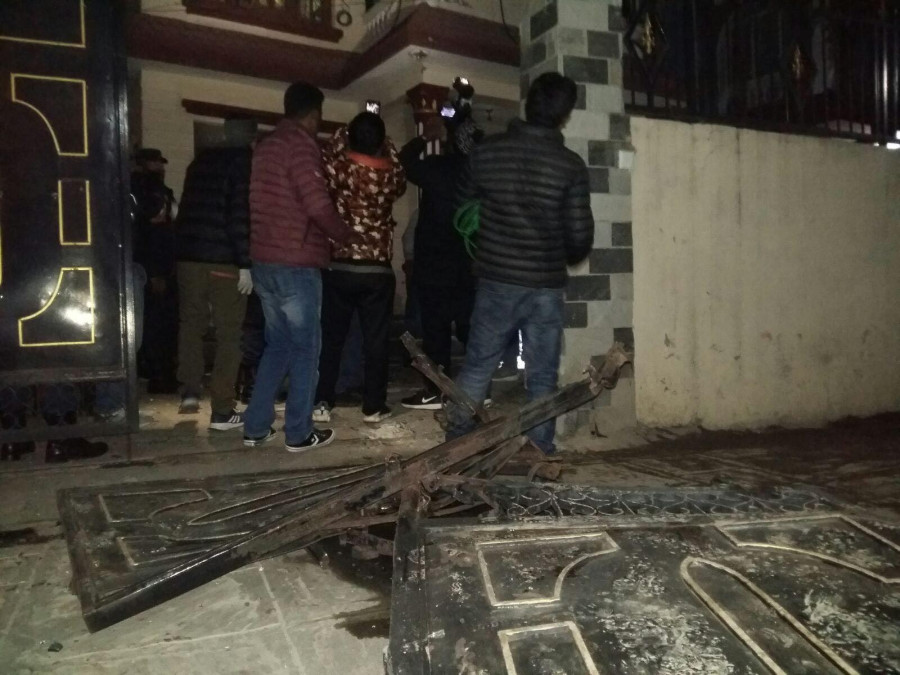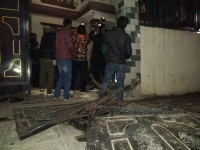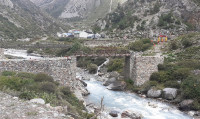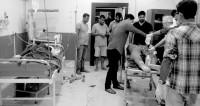National Security
Police’s intelligence continues to fail them as Chand party claims explosion
Despite the government designating the Chand party a criminal outfit, Wednesday’s explosion shows that security agencies are still unaware of their activities.
Shuvam Dhungana
On Wednesday evening, an improvised explosive device went off at Sano Bharyang in Kathmandu. The explosion, which was targeted at the house of Shova Kanta Dhakal, allegedly a key person in the Lalita Niwas land scam, was quickly claimed by the Netra Bikram Chand-led Communist Party of Nepal.
More IEDs were discovered in the Baluwatar area, where the prime minister and the chief justice's residences, and Nepal Rastra Bank are located. The Nepal Army managed to defuse the explosives and there were no casualties.
The larger question here, however, concerns the role of the security and intelligence agencies and their consistent failure to prevent the Chand party from carrying out terrorist activities. A senior police official who spoke on condition of anonymity told the Post that Nepal Police’s special anti-terrorism bureau has not been able to play an effective role, largely due to the mobility of people in the Capital.
“Kathmandu’s population is huge and thousands of people move in and out of the Capital every day,” said the official. “It is difficult to keep track of every individual.”
The government in March last year declared the Chand party a criminal outfit and banned all its activities. The decision followed an explosion in February last year in front of the Ncell headquarters in Nakkhu, Lalitpur. One person died and another was injured. Chand’s party, an offshoot of the Maoist party that once waged a decade-long insurgency, has been targeting foreign companies with Ncell as one of its major targets. The party has attacked several telephone towers of the private sector mobile giant across the country.
This time, in a statement, the Chand outfit claimed responsibility for the explosion at Dhakal’s house. Dhakal has been described as part of the “land mafia” in a report prepared by a government secretary for seizing the Baluwatar land illegally. The party said that it wanted to “sabotage” Dhakal because the KP Sharma Oli administration had failed to take action against people who were looting national property.
Though the government has said it is ready to hold talks with the Communist Party of Nepal, Chand has so far refused to come to the negotiating table, putting forth three preconditions—an official invitation for dialogue, unconditional release of all its cadres who have been arrested, and a lifting of the ban on its activities.
Since the signing of the peace deal, the government over the years has made overtures to several dissenting groups, including armed outfits, to join peaceful politics. The government in March last year signed a deal with a group led by CK Raut, who was campaigning for a ‘free Madhes’.
The only group that the government considers a security threat is Chand’s party and police have arrested hundreds of its cadres.
On Thursday, during the weekly press briefing in Singha Durbar, Minister for Communication and Information Technology Gokul Baskota said the government will not tolerate the Chand party’ activities.
“We have been urging the Chand group to join the political process,” said Baskota.
Analysts have long said that the government should make an all-out effort to bring any dissenting groups, even if they are armed, into mainstream politics and that any move to suppress them with force could be counterproductive.
Chand had formed his own party, accusing the Maoist leaders, including Pushpa Kamal Dahal, of abandoning the People’s War halfway. Chand wants to launch what he calls a “unified revolution” and has been vying to create his own military.
Months after the deadly blast in Nakkhu, Kathmandu witnessed a series of explosions in May where at least four people were killed. All four were Chand party members who were trying to rig gas cylinders into explosives when the cylinders went off. One explosion occurred in the Ghattekulo area, a stone’s throw away from Singha Durbar, the government seat.
Security experts had told the Post then that such blasts in the Capital indicated a serious intelligence failure. Given Wednesday’s explosion, this failure has not been addressed.
Police officials themselves say that such incidents are a cause for concern, especially because several countries across the world still consider Nepal risky. Countries like the United States, the United Kingdom and Australia in their travel advisories have warned their citizens of demonstrations in Nepal often turning violent and describing small blasts as the order of the day. This, officials say, is also a concern as the government wants to attract more foreign tourists as part of the Visit Nepal 2020.
Security officials responded that they were committed to controlling Chand’s activities and described Wednesday’s explosion as a one-off event.
“The Nepal Police is committed to stopping such criminal activities by the Chand group,” Deputy Inspector General Shailesh Thapa Chettri, spokesperson for the force, told the Post on Thursday. “We have arrested 1,359 members of the Chand party to date.”
Police said they have confiscated around 1,323 weapons, including guns, pistols, hand grenades, and bullets, from members of the Chand outfit since March.
“We have put 24x7 security checks in place at major entry points to Kathmandu,” said Chettri. “We are deploying more security personnel in plain clothes. But it is difficult to maintain surveillance on some lesser-known entry points.”




 18.37°C Kathmandu
18.37°C Kathmandu










